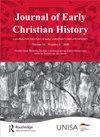Ambivalent Appropriation: Engagement with Apollo in Jewish and Christian Texts and Material Culture
IF 0.1
0 RELIGION
引用次数: 2
Abstract
Abstract This article considers ancient Jewish and Christian engagement with Apollo traditions in texts and material objects from the second century BCE to the sixth century CE. I track a shared strategy in which both Jews and Christians adopt imagery or tropes that surround Apollo, but either (1) reassign them to their god or Jesus, or (2) relocate them within spaces devoted to the worship of their god. In light of Roman imperial use of Apollo traditions, I draw on postcolonial theory to suggest that we might label this recurrent transformative strategy “ambivalent appropriation.” Persistent ambivalent appropriation of Apollo traditions by ancient Jews and Christians counters ancient narratives about Apollo’s prophecy at Delphi declining and/or ceasing, thereby challenging any notion of a twilight for Delphic prophecy.矛盾挪用:在犹太教和基督教文本和物质文化中与阿波罗的接触
本文考察了从公元前2世纪到公元6世纪,古代犹太人和基督教与阿波罗传统在文本和实物上的接触。我追踪了一种共同的策略,即犹太人和基督徒都采用围绕阿波罗的意象或比喻,但要么(1)将它们重新分配给他们的神或耶稣,要么(2)将它们重新安置在专门崇拜他们的神的空间里。鉴于罗马帝国对阿波罗传统的使用,我借鉴了后殖民理论,认为我们可以将这种反复出现的变革策略称为“矛盾挪用”。古代犹太人和基督徒对阿波罗传统的持续矛盾挪用与古代关于阿波罗在特尔斐的预言衰落或停止的叙述相反,从而挑战了特尔斐预言的黄昏的任何概念。
本文章由计算机程序翻译,如有差异,请以英文原文为准。
求助全文
约1分钟内获得全文
求助全文

 求助内容:
求助内容: 应助结果提醒方式:
应助结果提醒方式:


